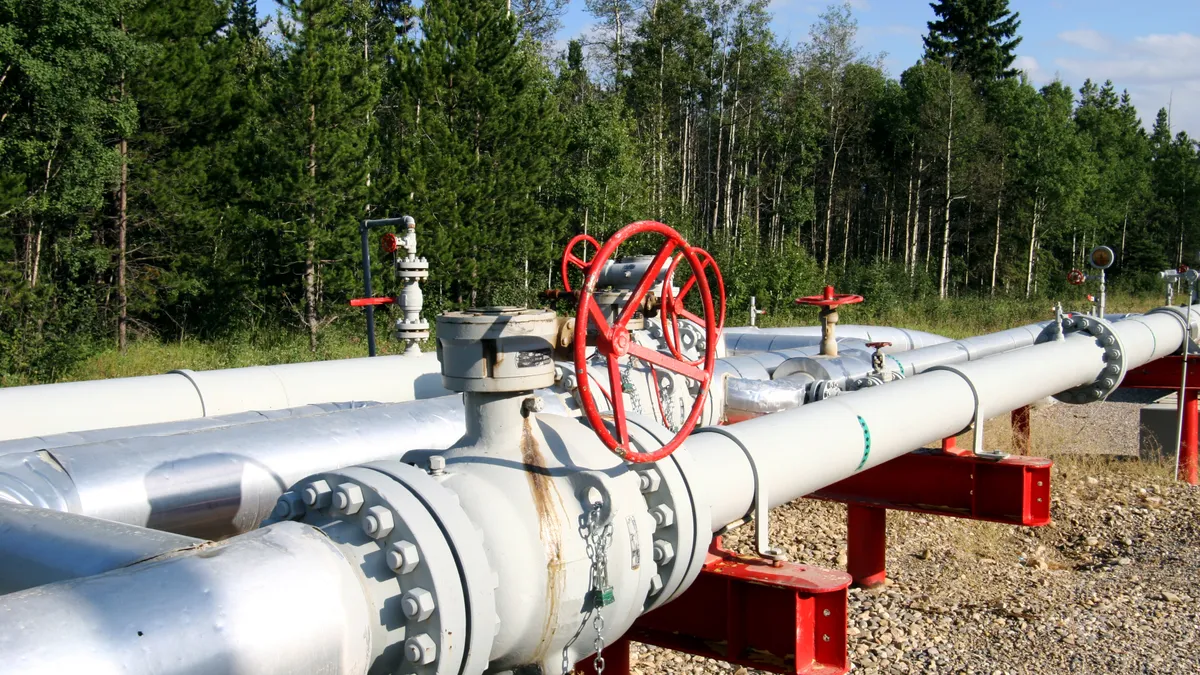Dive Brief:
-
The Federal Energy Regulatory Commission should ignore the Environmental Protection Agency's suggestion that FERC stop acting on natural gas infrastructure proposals until it revises its policy for how to review them, Consolidated Edison and KeySpan Gas East, a National Grid utility, said Friday.
-
Delaying the Iroquois Gas Transmission System's proposal to beef up its existing pipeline to increase gas deliveries to the New York City area would threaten reliability and safety, ConEd said in a filing at FERC.
-
"Despite the near-term impacts caused by the COVID pandemic and the recent enactment of a ban on new gas service connections within New York City limits, ConEd forecasts continued firm customer peak day gas demand growth in its service territory for the next several years," ConEd said.
Dive Insight:
Across the United States, environmental and other groups are urging regulators to stop enabling the expansion of the natural gas system, which they say will lead to increased greenhouse gas emissions (GHG). FERC is preparing to update its decades-old criteria for reviewing gas infrastructure proposals, a revision that could affect how the agency considers potential GHG emissions from a project and its effect on the climate.
In New York, Iroquois Gas proposed expanding capacity on its pipeline by 125,000 million cubic feet per day by upgrading four existing compressor stations. Half the capacity is under contract to KeySpan Gas and half to ConEd.
In part, the extra gas supply is needed to facilitate a New York City policy that aims to slash the use of oil to heat buildings, according to ConEd.
FERC staff released an environmental assessment for the project in September 2020, typically the last step before the agency makes a decision on a proposed project.
However, responding to court decisions, in May 2021, FERC ordered its staff to revise pending environmental reviews by bolstering their greenhouse gas emissions analysis, a move that sparked concerns by Sen. John Barrasso, R-Wyo., about delays to the process.
FERC staff issued a final environmental impact statement for the Iroquois Gas expansion project in November with an expanded GHG analysis, including an estimate of the project's downstream emissions. Staff estimated it could increase New York's emissions by 1.4% and Connecticut's emissions by 0.22% over 2018 levels.
The proposed project comes as New York is taking steps to cut its GHG emissions 40% below 1990 levels by 2030 and 85% by 2050 below 1990 levels.
In December, the EPA said FERC staff's expanded GHG analysis was inadequate and recommended the commission delay its review of the Iroquois Gas proposal and all other gas projects until after the commission updates its 1999 policy for reviewing gas infrastructure. FERC should then revise its analysis of pending gas proposals based on the updated policy, according to the EPA.
In its comments at FERC, ConEd said it supports New York's GHG reduction goals and is working to cut natural gas use and "reimagine" how its gas system could be used.
Even so, increased gas demand is exceeding its firm gas pipeline capacity needed to reliably and safely serve its customers on cold winter days, the utility company said, noting that energy efficiency programs, which have helped cut gas use, aren't enough to meet its gas needs.
"Recent growth and forecasts of future growth in customer demand for natural gas in Con Edison's service territory on the one hand, and the resistance to traditional, large-scale natural gas infrastructure projects that involve the construction of new pipelines on the other, requires creative thinking to address these competing concerns," ConEd said.
National Grid echoed ConEd's comments. "National Grid has been clear that further delays in the permitting of the project will impede its ability to fulfill its legal obligation to reliably serve customer demand," the company said.
Following the EPA's recommendation to reevaluate the proposed project using revised policies would diverge from FERC's traditional approach of evaluating certificate applications based on the policy guidance in effect at the time the application was filed, National Grid said.
However, if FERC approves projects under its 22-year-old review policy, those decisions risk being overturned in court, as they have before, according to Gillian Giannetti, an attorney with the Sustainable FERC Project, a coalition housed at the Natural Resources Defense Council.
The primary risk is that projects that are unneeded or contrary to the public interest could be approved under an outdated policy statement, Giannetti said Monday.
"The longer that FERC goes without issuing a policy statement, the higher the risk FERC will issue a decision that is contrary to law" by failing to adequately consider its effects on GHG emissions and environmental justice communities or whether it is needed, Giannetti said.














